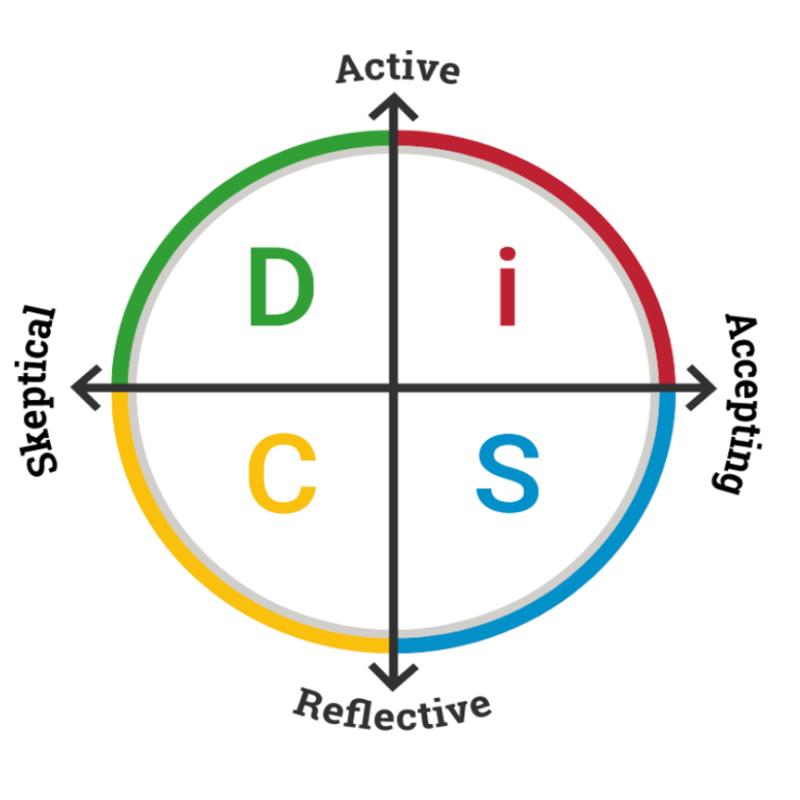Understanding DiSC D Personality
Are you a D type personality? Do you sometimes feel like you’re too domineering or aggressive in the workplace? Understanding what makes up a D personality style can help you learn to harness your strengths and overcome your weaknesses. In this blog, we’ll delve into the science of DiSC profiles and understand what it means to be a D style. We’ll also explore how D personality styles contribute to a team, their motivating factors, and some key do’s and don’ts when working with them. Finally, we’ll discuss growth opportunities for D personality styles and what kind of work environment they thrive in.
If you’re still unsure about whether you’re a D type or not, don’t worry! We’ve included a section on discovering your DiSC profile personality style as well as answering some frequently asked questions. Let’s get started on understanding the fascinating world of D types!
What is a Type D personality?
A Type D personality style is characterized by dominance and a strong sense of urgency. People with this DiSC style are results oriented and often have high expectations. They value personal freedom and tend to set high standards for themselves and others. Due to their assertiveness and drive, D types often excel in leadership roles, making understanding their personality traits crucial for effective teamwork and collaboration.
Individuals with a high D DiSC style tend to exhibit certain characteristic traits and behaviours:
- Assertive: Dominant individuals are typically assertive and confident. They are comfortable taking charge and leading others.
- Results-Oriented: They are highly focused on achieving goals and outcomes. They value productivity and often have a strong desire to see tangible results.
- Direct Communicators: D-style individuals are direct and straightforward in their communication. They value efficiency and prefer getting to the point.
- Independent: They are often self-reliant and prefer making decisions on their own. They may resist being micromanaged and value autonomy.
- Competitive: Dominant individuals enjoy competition and may thrive in challenging environments. They have a strong desire to win and succeed.
- Problem-Solvers: They are often skilled at identifying and solving problems. They approach challenges with a pragmatic and solution-focused mindset.
- Impatient: D-style individuals may be less patient with slow-paced or indecisive processes. They prefer to move quickly and make decisions promptly.

How Does a D Type Contribute to a Team?
Individuals with a dominant personality type, commonly referred to as D types, can bring significant benefits to a team. They possess a strong sense of urgency and drive, which makes them natural leaders who are not afraid to make tough decisions. Their determination to achieve goals and their ability to motivate others can inspire the team to perform at their best.
With an unwavering focus on results and efficiency, D types can contribute significantly to creating a high-performing team. These qualities make them valuable assets in any organization that values productivity and success. However, it is important to note that D types may need to work on developing their interpersonal skills, such as empathy and active listening, to ensure effective communication within the team and avoid conflicts.
Motivating Factors for D Personalities
D personalities, or individuals with the D style, are motivated by challenges and opportunities for growth. They thrive on achieving tangible results and being recognized for their accomplishments. Personal freedom and the ability to make independent decisions are highly valued by D types. Additionally, they are motivated by high standards and the opportunity to lead others. The sense of accomplishment and success is what drives D personalities forward.
What Fears Might a D Type Have?
D types may have fears such as failure, losing control, being taken advantage of, or seen as weak. They may also fear micromanagement, rules and regulations, not meeting their own standards, and being unable to achieve their goals or make an impact.
Working with the Dominance D Type: Do’s and Don’ts
When working with individuals with a D personality style, it is essential to provide clear expectations and deadlines for tasks. Giving them autonomy and the opportunity to take charge can also be highly beneficial. Offering challenges and opportunities for growth will keep them engaged. It’s important, however, to avoid micromanaging or restricting their decision-making power. Additionally, don’t overlook their need for recognition and appreciation.
Working with Other D Types
When working with other D types, it is important to recognize and respect their need for autonomy and control. Collaboration should be direct and assertive, with a focus on sharing ideas. Providing clear roles and responsibilities within the team is crucial, as is being open to their leadership and decision-making style. Together, the goal should be to achieve results and accomplish goals.
Working with I Types
Working with I (Influence) types, which are individuals who are extroverted and outgoing, requires a different communication style. Encouraging collaborative brainstorming sessions and group discussions can help tap into their creativity. It’s important to be flexible and spontaneous in your work approach while acknowledging their enthusiasm and energy. Supporting the need for social interaction and networking opportunities can also help them thrive.
I types tend to be more expressive and sociable than other personality types. They enjoy being around people, building relationships, and collaborating with others. Therefore, it is essential to provide them with ample opportunities to interact with others in a work setting.
Since they tend to be creative thinkers, it is helpful to engage them in brainstorming sessions or group discussions when working on projects. This approach allows them to share their ideas freely and collaborate with others.
It’s also important to recognize that I types may not always follow a strict schedule or routine. They often prefer flexibility in their work approach, allowing them to adapt quickly to changes as needed.
Finally, supporting their need for social interaction is vital. Providing networking opportunities or encouraging team-building activities can help keep I types motivated and engaged at work.
Working with S Types
Collaborating with individuals with S (Steadiness) type personalities in the workplace can bring a balanced approach to work. Their steady and supportive nature can help foster strong team relationships, which is essential for achieving success. When working with S types, it’s important to practice patience and empathy since they value stability. Providing clear expectations and consistent communication is crucial for maintaining a positive working relationship with them.
It’s also necessary to appreciate their attention to detail and thoroughness in projects. This trait allows them to produce high-quality work that meets or exceeds expectations. Moreover, their ability to maintain a calm demeanor even in stressful situations can help create a positive work environment and inspire others on the team.
In addition, it is beneficial to understand that S types may not be as comfortable with change as other personality types. Therefore, when introducing new ideas or processes, it’s essential to provide ample time for them to adjust and offer reassurance about how the change will benefit everyone. Ultimately, collaborating with S types can contribute significantly to achieving team goals while fostering a positive and supportive workplace culture.
Working with C Types
Collaborating with individuals who possess a C (Conscientiousness) type personality can result in precise and accurate outcomes. Their analytical and detail-oriented nature makes them valuable problem solvers, but to support their need for accuracy and quality, it is essential to provide clear guidelines and deadlines.
It is important to understand that C-types may require additional time for research and analysis before making decisions or taking action. They appreciate logical reasoning and evidence-based approaches to work, so be sure to incorporate these elements into your collaboration efforts. Overall, working with C-types can be highly beneficial as long as you are willing to adapt your communication style and work approach to suit their needs.
Also read What DiSC Personalities Work Best Together?
D style variations
Understanding the “D” style variations in the DiSC personality model opens a door to comprehending the diverse ways in which individuals with dominant traits engage with the world around them. However, within this broad category, there are nuanced variations that give insight into how people with dominant traits express themselves, interact with others, and approach challenges.
Exploring these “D” style variations allows us to appreciate the richness and complexity of human behaviour, shedding light on the unique strengths and potential challenges that different Dominant personalities may bring to the table. Let’s delve into the fascinating world of “D” style variations to uncover the intricacies of this dynamic personality type.
The Di Style
The Di Style refers to individuals who are highly motivated by achieving results and thrive in fast-paced environments. They possess a strong desire for excellence and set high expectations for themselves as well as others. With their determination and focus on tangible outcomes, they excel in situations where they can take charge and make things happen. Their decisiveness and assertiveness often enable them to effectively lead teams or manage projects to achieve significant results. However, it is important for those with the Di Style to be mindful of their tendency towards impatience or overconfidence, which can sometimes lead to taking unnecessary risks or overlooking important details.
The DC Style
People with a DC style possess traits of dominance and steadiness, which makes them confident leaders who place great value on teamwork and collaboration. They have an exceptional ability to communicate their vision and possess a big-picture perspective. Furthermore, DC types are able to balance assertiveness with empathy towards those they work with. They have a talent for finding solutions that benefit both individuals and the team as a whole. Their skills make them valuable assets in any workplace, particularly in positions of leadership where they can inspire others to achieve success together.
Growth Opportunities for D Type Individuals
D types have the potential to thrive in leadership positions due to their assertiveness and confidence. Encouraging them to further develop their delegation and teamwork skills can help them excel even more. Providing challenging projects that yield tangible results gives D types the opportunity to showcase their abilities. Supporting their ability to adapt to different work environments and offering training programs focused on interpersonal skills can further enhance their growth.

Ideal Work Environment for D Types
D types thrive in fast-paced, competitive work environments that value efficiency, action, and results. Open communication and directness are encouraged to align with their preferences. Providing opportunities for autonomy and decision-making allows D types to flourish. Recognizing and rewarding high standards and accomplishments fosters a motivating environment for these high-performing individuals.
How Does a High D Type Handle Details and Analysis?
High D types excel at focusing on the big picture, leaving the finer details and analysis to others. Efficiency is their priority, and they make quick decisions based on instincts and the bottom line. Collaborating with detail-oriented team members can benefit them.
Are You a DiSC D Personality Type? Discovering Your DiSC Personality Style
Discover your unique DiSC personality style by taking the DiSC model assessment. Uncover the traits and behaviours associated with your DiSC style, and understand how they influence your communication and work style. Identify your strengths and growth areas as a D type to maximize your potential in the workplace.

Help Your Business Run Better
As your business evolves and grows, your people must also ebb and flow. Human transformation enables you to fine-tune leadership, develop talent, and become resilient. At Evolved Metrics we work with you and your team to make your business run cleaner, we build a customized program that improves workplace effectiveness across a variety of skill areas and generates continuous growth among your team.
Frequently Asked Questions
What are common misconceptions about D’s
While the D personality type is often associated with dominance and aggression, it’s important to note that this is not always the case. D’s can also be highly motivated, goal-oriented, and assertive. However, they may struggle with patience and listening skills. Understanding the strengths and weaknesses of a D personality type can lead to more effective communication and collaboration in the workplace. Stereotyping individuals based on their DiSC profile should be avoided, using it instead as a tool for understanding and improving interpersonal relationships.


